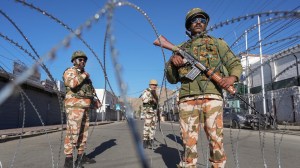BJP’s weapons of mass persuasion
Just one year ago the economy was in the dumps, agricultural and industrial production was declining, investment in both sectors was shrinki...

Just one year ago the economy was in the dumps, agricultural and industrial production was declining, investment in both sectors was shrinking, unemployment was mounting, fiscal deficit was unmanageable, the Congress ruled in 14 states and Gujarat was the largest of the four states ruled by the BJP. Then there was a bountiful monsoon. So, all economic indicators started moving upwards. And to cap this stroke of good luck, the BJP snatched three states from the Congress.
Suddenly, India started ‘‘shining’’ and became ‘‘incredible’’, people began ‘‘feeling good’’. Overnight, we were racing to become one of the world’s leading economies.
The BJP has, no doubt, performed well in certain areas. But this euphoria has little relation to ground reality. It owes much of its efficacy to the marketing of BJP’s brand equity by ingenious media management, by fielding telegenic faces and glib talkers having a penchant for one-liners.
Even the results of the recent assembly elections have been projected as a turning point. These elections are supposed to have secularised the Indian polity. The loss of three states by the Congress to the BJP is attributed to bad governance. It is ironical how a party committed to Hindutva and sectarian politics is hawking a secular agenda of development and growth.
In fact, developmental issues were always an important factor in electoral battles. This is the main reason for the anti-incumbency factor. The level of deprivation in India is so high that even reasonably competent chief ministers cannot even partially satisfy the people’s expectations. In Madhya Pradesh and Chhattisgarh the Congress had already ruled for two full terms and it was most unlikely for it to return to power. In Rajasthan, its chief minister’s performance was commendable. But the handicap of incumbency was compounded by caste politics, Hindutva spillover from Gujarat and weak organisational backup.
With regard to the triumph of secular issues and marginalisation of identity politics, these elections deserve only one-and-a-half cheers. Is it possible that perceptions and prejudices formed over millennia are shaken off in one go? Is it logical to ascribe Laloo Yadav’s grip over Bihar or Modi’s victory in Gujarat to good governance? India’s mosaic is too complex to be configured by single issues. It differs from state to state and election to election.
Political analysts have pointed out that whereas India never shone so brightly for the twenty per cent comprising the middle classes, the shine has not touched the remaining eighty per cent. Andhra Pradesh is the showpiece of the NDA. Crushed under debt, thousands of its farmers have committed suicide. Starvation deaths are routinely reported from several states. Mountains of food grain rot in godowns. Per capita consumption of cereals and pulses has gone down in the last decade. India’s population is increasing at the rate of two per cent and its employment growing at less than one per cent per year.
The BJP has shown keen awareness of the fact that Indian politics has become professionalised. It has created an efficient media outfit, its party organisation runs like a well-oiled machine. RSS cadres work tirelessly to mobilise electoral support for the party. The sangh runs 40,000 single-teacher schools in Madhya Pradesh alone. That is how it wiped out the Congress from the tribal belt. It was the same in Chhattisgarh. The BJP wins hands down in media management and organisational efficiency.
Let there be no doubt that if the BJP returns to power, it will follow a far more aggressive Hindutva agenda than it has done so far. Vajpayee is rightly credited with sagacity and statesmanship. But he is also an astute politician. It is not generally realised how systematically he has emasculated all his alliance partners. The education minister has systematically saffronised school education, as also research institutes receiving government grants. Now he is extending the BJP’s hegemony over leading technical and professional institutions. Handpicked loyalists man critical positions in the official media.
And let us not forget that BJP ministers have repeatedly asserted their commitment to Hindutva and it was only compulsions of coalition politics which tampered their fervour. The RSS has already announced that even if the Ayodhya dispute is resolved, its demand for Mathura and Kashi will not be given up. It is not unlikely that the next time, the zeal of the BJP-led government might get the better of its discretion.







- 01
- 02
- 03
- 04
- 05
























